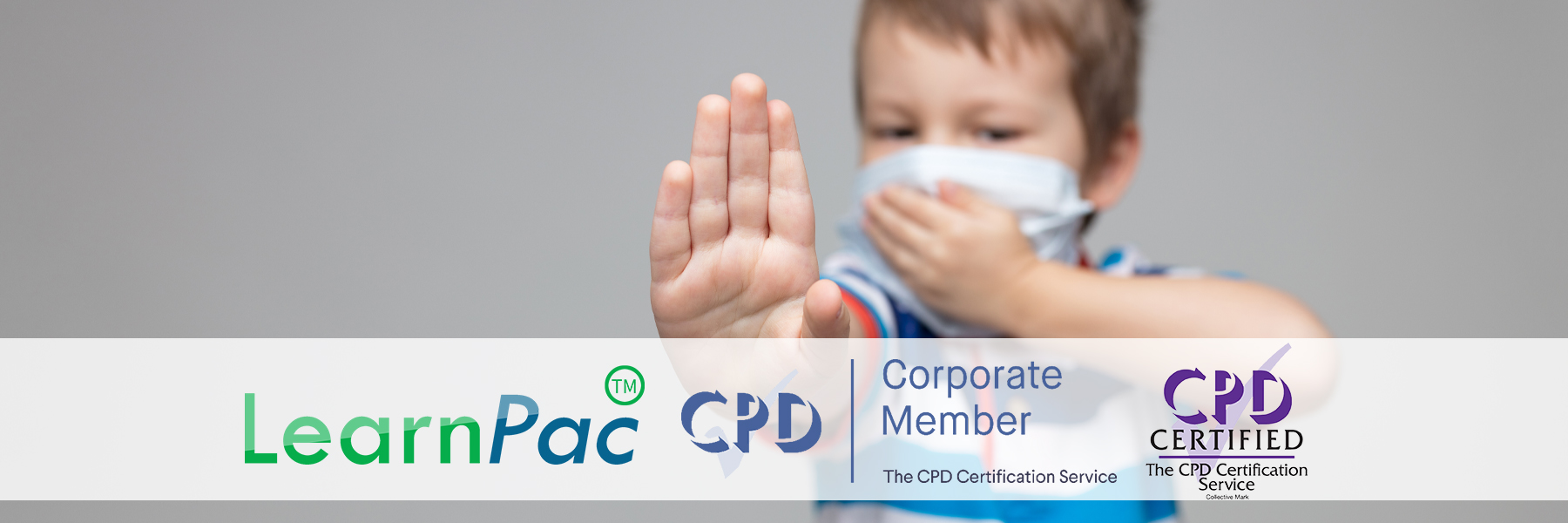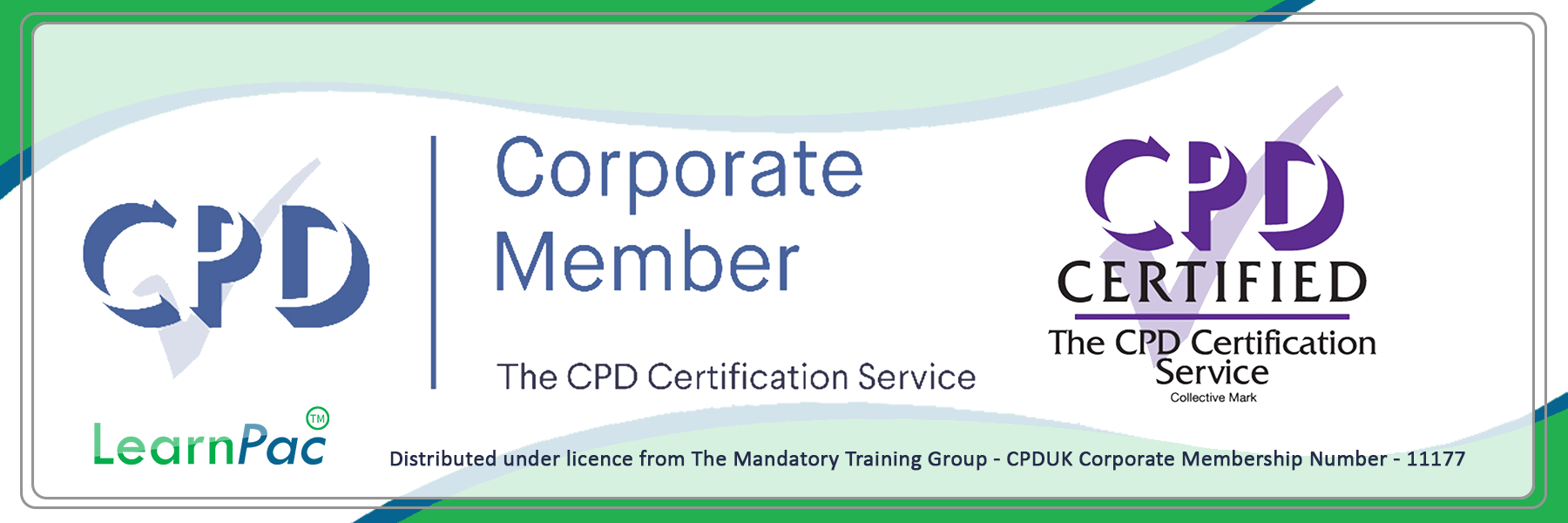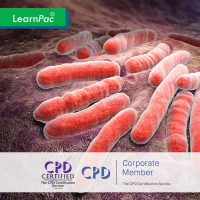Infection Prevention and Control - E-Learning Courses - CPDUK Accredited

Infection Prevention and Control – E-Learning Courses with Certificates – CPDUK Accredited.
LearnPac Systems is the leading UK provider of accredited statutory and mandatory training courses for all sectors, including health and social care, education, local government, private and charity sectors.
The primary goal of infection prevention and control e-Learning courses is to highlight the importance of infection prevention procedures, and the impact of healthcare-associated infections.
Our infection prevention and control e-Learning courses include IPC practices, the chain of infection, standard and transmission-based precautions, barriers and use of personal protective equipment (PPE), and strategies for preventing the spread of infectious disease to healthcare workers and patients.
Browse our Infection Prevention and Control - E-Learning Courses
Infection Prevention and Control: Frequently Asked Questions and Answers
Infection Prevention and Control – E-Learning Courses with Certificates – CPDUK Accredited – LearnPac Systems UK.
Here at LearnPac Systems, we receive many questions about infection prevention and control. We have provided answers to the most frequently asked questions about infection prevention and control.
Click on the text below to see the answers to the Frequently Ask Questions about Infection Prevention and Control.
Infection prevention and control (IPC) is a scientific approach and practical solution designed to prevent harm caused by infection to patients and health workers. It is grounded in infectious diseases, epidemiology, social science and health system strengthening.
LearnPac Systems is the leading UK provider of accredited statutory and mandatory training courses for all sectors, including health and social care, education, local government, private and charity sectors.
Click here for Infection Control in Health and Care – Online Course – CPD Accredited
Basic infection control procedures include:
- Handwashing and keeping the workplace clean
- Washing your hands before and after handling food
- Avoiding touching your hair, nose or mouth
- Keeping the hot food hot and cold food cold.
LearnPac Systems is the leading UK provider of accredited statutory and mandatory training courses for all sectors, including health and social care, education, local government, private and charity sectors.
Click here for Infection Prevention and Control – Level 2 – Online Course – CPD Accredited
Sleep improves the potential ability of some of the body’s immune cells to attach to their targets, according to a new study. The study helps explain how sleep can fight off an infection. In contrast, other conditions, such as chronic stress, can make the body more susceptible to illness.
Also known as infection control tool, an infection control checklist is used in healthcare facilities such as hospitals, clinics, and nursing homes to assess cleanliness, infection control practices, and compliance with hygiene standards.
IPC training courses include infection prevention and control practices, the chain of infection, standard and transmission-based precautions, barriers and use of personal protective equipment (PPE), and strategies for preventing the spread of infectious disease to healthcare workers and patients.
LearnPac Systems is the leading UK provider of accredited statutory and mandatory training courses for all sectors, including health and social care, education, local government, private and charity sectors.
Click here for Care Certificate Standard 15 – Online Training Course – CPD Accredited
Infection control certificate training provides in-depth information on:
- How to reduce transmission of pathogens in healthcare settings
- Specific practices and contexts that raise exposure potential to healthcare workers and patients
- Different work practice controls to prevent exposure.
There are different types of infection, including bacterial, fungal, viral, protozoan, parasitic, and prion disease. Infections can range from mild inflammation in one person to an epidemic.
Infection control principles and practices for local health agencies are as follows:
- Standard precautions
- Hand hygiene
- Personal protective equipment (PPE)
- Needlestick and sharps injury prevention
- Cleaning and disinfection
- Respiratory hygiene (cough etiquette)
- Waste disposal
- Safe injection practices.
An infection control nurse specialises in preventing the spread of infectious agents, such as viruses and bacteria. As an infection control nurse, you will have a hand in avoiding dangerous outbreaks and epidemics. In a medical setting, infectious agents are by no means uncommon.
The education requirement to become an infection control nurse is to earn a Bachelor’s of Science in Nursing (BSN) degree. Although a nursing diploma or an Associate’s Degree in Nursing has been the minimum requirement, many employers prefer graduate nurses to obtain a bachelor’s degree in nursing.
These include standard precautions (hand hygiene, PPE, injection safety, environmental cleaning, and respiratory hygiene/cough etiquette) and transmission-based precautions (contact, droplet, and airborne).
A pathogen is a tiny living organism, such as a bacterium or virus, that can cause infection. Frequently washing your hands helps you avoid the pathogens that can make you sick. Pathos is the Greek word for disease and -genes means “born of.”
Bacterial infections are caused by the transmission of bacteria. You can be exposed to bacteria from other people, through the environment, or from eating contaminated food or drinking contaminated water.
Infection occurs when viruses, bacteria, or other microbes enter your body and begin to multiply. Disease, which typically happens in a small proportion of infected people, occurs when the cells in your body are damaged as a result of infection, and signs and symptoms of an illness appear.
The chain of infection is made up of six different links. These are pathogen (the infectious agent), reservoir, the portal of exit, means of transmission, the portal of entry, and the new host. Each link has a unique role in the chain, and each can be interrupted, or broken, through various means.
Hand washing is the single most effective way to prevent the spread of infections. You can spread certain “germs” (a general term for microbes like viruses and bacteria) casually by touching another person.
They are the necessary level of infection control precautions which are to be used, as a minimum, in the care of all patients. Hand hygiene is a major component of standard precautions and one of the most effective methods to prevent transmission of pathogens associated with health care.
The following steps may adequately prevent the spread of infection in hospitals:
- Handwashing
- Creating an infection-control policy
- Identifying contagions ASAP
- Providing infection control education
- Using gloves
- Providing isolation-appropriate personal protective equipment
- Disinfecting and keeping surfaces clean
- Preventing patients from walking barefoot.
The role of the infection prevention and control team is to ensure that the risk of infection to patients, visitors and staff is minimised through a range of prevention and control processes. The team closely monitors infection rates and undertakes audits to maintain consistently high standards across all sites..
The objectives of the Infection Prevention and Control Committee (IPCC) are:
- To advise the Chief Executive and Trust Board on all aspects of infection prevention and control
- To provide assurance that the environment within the Trust is safe for patients, visitors and staff in terms of infection prevention and control
- To provide assurance that all appropriate measures are being taken to assist the Trust with the achievement of national and local infection prevention and control targets
- To ensure corrective action has been initiated and managed where gaps are identified in relation to risks.
Each department must assign an infection control officer. He is responsible for maintaining a liaison with the fire department physician, the health and safety officer, the infection control representative at health care facilities and other health care regulatory agencies.
Infection control in childcare settings involves carrying out risk assessments and putting measures in place to control any risks identified. Example of which is the potential risk from contaminated equipment, the environment, blood and body fluid spills, waste, used linen and children and staff who may have an infectious disease.
Small and sick newborns admitted in hospitals are at a higher risk of acquiring infections while confined in the hospital. While infection prevention and control training are generic, requiring specific orientation for service providers working at neonatal intensive care units is a must.
Infection control procedures are precautions taken in health care settings to prevent the spread of disease. Infection control precautions also require all dental staff involved in patient care to use appropriate protective garbs such as gloves, masks, gowns and eyewear.
Infection prevention and control training courses will help you to improve infection control standards in your environment and reduce the number of associated healthcare infections. You will also learn to understand and apply infection prevention and control and patient safety principles in health care settings.
LearnPac Systems is the leading UK provider of accredited statutory and mandatory training courses for all sectors, including health and social care, education, local government, private and charity sectors.
Click here for more Infection Prevention and Control E-Learning Courses
On successful completion of each of the infection prevention and control courses modules, you will be able to download, save and/or print a quality assured continuing professional development (CPD) certificate. Our CPD certificates are recognised internationally and can be used to provide evidence for compliance and audit.
The CPD Certification Service (CPDUK) accredits all of our statutory and mandatory training courses as conforming to universally accepted Continuous Professional Development (CPD) guidelines.
LearnPac Systems is distributed under the licence from The Mandatory Training Group – CPDUK Corporate Memebrship Number – 1117.





